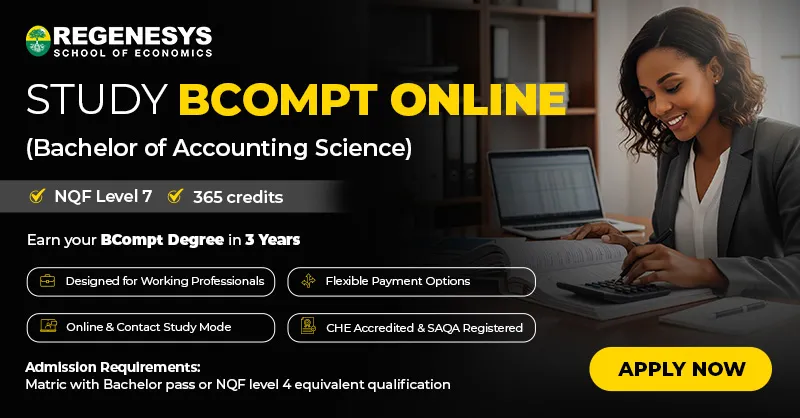Accountants are essential professionals who play a crucial role in managing the financial health of businesses and individuals in South Africa. Their expertise extends across various areas, including financial reporting, taxation, and auditing, ensuring that financial records are accurate and compliant with regulations. Moreover, given the importance of their work, accountants contribute to informed decision-making and strategic planning within organisations, making their role essential in today’s economy.
So, if you are considering a career in accounting in South Africa, it is important to understand the educational pathways and qualifications needed to succeed in this field.
In this article, we will answer the question, ‘How to become an accountant?’ by exploring the educational requirements and professional certifications. We will also discuss the practical experience, skills and specialisation necessary for success in this career.
Table of Contents
- How to Become an Accountant in South Africa?
- Educational Requirements for Becoming an Accountant
- What are the Professional Qualifications for Becoming an Accountant?
- Importance of Practical Experience to Become an Accountant
- Registering with Professional Bodies in South Africa
- What are the Specialisations in Accounting?
- Skills and Qualities Needed to Succeed as an Accountant
- Career Opportunities in the Accounting Field
- Conclusion
- How To Become An Accountant? – FAQs
How to Become an Accountant in South Africa?
Pursuing a career as an accountant in South Africa is a rewarding journey that offers numerous opportunities across various sectors. However, to the question how to become an accountant?’, the answer is you should follow a clear path that includes education, practical experience, and professional accreditation.
Here is a detailed look at the steps involved:
Step 1: Complete a Relevant Qualification: Start by earning a recognised degree in accounting or a related field. This typically involves obtaining a degree in accounting or a related field, such as Bachelor of Accounting, Bachelor of Accounting Science or Bachelor of Commerce (BCom) in Accounting.
Step 2: Gain Practical Experience: After completing your degree, you will need to gain hands-on experience. This typically involves completing an internship. During this time, you will work under the supervision of a qualified accountant, allowing you to apply what you have learned in a real-world setting.
Step 3: Obtain Professional Accreditation: Once you have gained sufficient experience, you will need to pass the required board exams to become accredited. You can register with one of the professional accounting bodies, such as SAICA, SAIPA, or CIMA, depending on your career goals.
Step 4: Continue Professional Development: To stay current in the field, engage in ongoing education and training. This can include attending workshops, seminars, and networking events. Continuing Professional Development (CPD) is essential to maintain your professional status and keep your skills up to date.
With these steps, you now know how to become an accountant in South Africa and pave the way for a successful and fulfilling career in the financial sector.
Educational Requirements for Becoming an Accountant
The path to becoming an accountant begins with the right education. That means to pursue a career in accounting, it is essential to meet specific educational and professional requirements. So, while you are planning to learn how to become an accountant, you must follow the right educational steps. The following are the educational requirements you should meet to become an accountant:
- High School Preparation: Choosing the right subjects in high school helps students build essential skills and knowledge for a career in accounting. Subjects like Mathematics, Accounting, Business Studies, Economics, English, and Information Technology are beneficial for developing a well-rounded skill set needed in the accounting profession.
- Obtain a Bachelor’s Degree: To become an accountant, you need to earn a degree that provides the foundational knowledge required for the field. These degrees typically take three years to complete and should be pursued at a university accredited by the South African Institute of Chartered Accountants (SAICA).
- Earn Master’s Degree: Getting a master’s degree in accounting helps you qualify for specialised or managerial roles. It can also lead to better job opportunities and higher salaries. Besides, you can stand out in the job market and increase your earning potential.
Also, read our article on Which Degree is Best for an Account Science?
However, if you are wondering, ‘Where can I study accounting in South Africa?’, you must know that there are universities and institutions offering accounting programmes. With institutions like Regenesys, you will get well-structured programmes designed to prepare you for a successful career in accounting.
What are the Professional Qualifications for Becoming an Accountant?
After completing an accounting degree, earning professional qualifications is essential to advancing your career and specialising in certain areas. These certifications are highly respected and provide accountants with the credentials needed to stand out in the field. So, while exploring how to become an accountant, you should know these professional qualifications.
Below are the main professional qualifications you can pursue:
- Chartered Accountant (CA): The most prestigious qualification in South Africa, obtained through the South African Institute of Chartered Accountants (SAICA). It is ideal for those looking to work in high-level roles such as auditing, taxation, or financial management.
- CIMA (Chartered Institute of Management Accountants): While learning how to become an accountant, you must know that this certification focuses on management accounting and is great for accountants who want to specialise in business strategy and financial decision-making within organisations.
- ACCA (Association of Chartered Certified Accountants): ACCA is a global qualification that prepares accountants for diverse roles in accounting, auditing, and finance.
- SAIPA (South African Institute of Professional Accountants): SAIPA offers a professional qualification for those looking to work in general accounting, with a focus on practical, business-oriented skills.
Importance of Practical Experience to Become an Accountant
If you have questions like ‘How to study accounting?’, you must know that along with pursuing educational qualifications, you should gain practical experience. This helps learners develop the hands-on skills needed to excel in accounting. It bridges the gap between theoretical knowledge and real-world application, allowing aspiring accountants to gain valuable insights into auditing, tax, financial reporting, and other key areas.
During internships or articles, candidates sharpen their analytical skills, improve their understanding of accounting software, and build a competitive edge in the job market. This experience is highly valued by employers and often required for professional qualifications. As a result, it ensures accountants are job-ready and adaptable to evolving industry demands.

Registering with Professional Bodies in South Africa
After passing the necessary board exams and completing your internship, the next step is to register with a professional body. Registration improves your professional credibility and gives you access to valuable industry networks. It also ensures compliance with professional standards. In South Africa, as you understand how to become an accountant, you should know that the accountants typically register with:
- SAICA (South African Institute of Chartered Accountants)
- CIMA (Chartered Institute of Management Accountants)
- SAIPA (South African Institute of Professional Accountants)
Membership in these bodies requires continuous professional development (CPD) to ensure you remain updated on the latest industry standards and practices. CPD includes attending workshops, courses, or seminars relevant to your area of expertise.
What are the Specialisations in Accounting?
Accounting has a variety of specialisations that enable professionals to focus on specific areas of expertise within the field. These specialisations can help tailor your career to specific industries, such as finance, consulting, or the public sector. Hence, while you learn how to become an accountant, you must know the specialisations in accounting.
The following are top specialisations in accounting:
- Financial Accounting
- Management Accounting
- Forensic Accounting
- Internal Financial Reporting
- External Financial Reporting
- Tax Accounting
- Auditing
Also, understand the Different Specialisations within the Bachelor of Accounting Science
Skills and Qualities Needed to Succeed as an Accountant
To understand how to become an accountant, it is important to recognise that success in this field goes beyond academic qualifications. It requires a mix of essential skills and qualities that help accountants excel in their roles.
Here are some key skills needed to succeed as an accountant:
- Time management
- Analytical thinking
- Problem-solving skills
- Organisation and strong attention to detail
- Excellent written and verbal communication skills
- Proficiency in accounting software and financial management systems
- Business knowledge
- Customer service
Career Opportunities in the Accounting Field
The demand for accountants in South Africa and globally makes this a secure career choice, offering numerous opportunities for growth. As an accountant, if you are wondering, ‘What can I do with an accounting degree?’ you can work in a variety of roles, from entry-level positions to senior management. Remember, you can land senior-level positions with higher qualifications, experience and skills.
Here are some career opportunities available in the accounting field:
- Tax Accountant
- Cost Accountant
- Financial Advisor
- Cost Estimator
- Payroll Manager
- Comptroller
- Accounting Manager
- Tax Manager
- Chief Financial Officer (CFO)
Explore the Accounting Jobs in South Africa
Conclusion
Becoming an accountant in South Africa offers many opportunities due to its high demand across various sectors. So, if you want to know how to become an accountant, you must follow a structured educational pathway, gain practical experience, and obtain professional qualifications. This way, aspiring accountants can establish themselves as competent professionals in the field. With diverse career roles ranging from tax accountants to Chief Financial Officers, individuals can tailor their careers to align with their interests and strengths. However, ongoing learning and skill development are essential to stay current in this accounting field.
Regenesys School of Economics offers the Bachelor of Accounting Science programme, equipping you with essential skills and knowledge for a successful career in accounting. Enrol today!
How To Become An Accountant? – FAQs
Where to study accounting in South Africa?
You can study accounting at various universities and institutions across South Africa, such as Regenesys, which offers well-structured accounting programmes.
How do you study accounting?
To study accounting, focus on understanding fundamental principles, practising problem-solving, using study resources like textbooks and online courses, and participating in study groups for collaborative learning.
How many years to become an accountant?
A bachelor’s degree in accounting typically takes three years to complete, followed by an internship or practical experience. Additionally, obtaining professional accreditation may take another one to two years.
Which subjects are required for an accountant?
Important high school subjects for aspiring accountants include Mathematics, Accounting, Business Studies, Economics, and English. These subjects build the foundational knowledge needed for a career in accounting.
What jobs can you get with an accounting degree?
With an accounting degree, you can pursue various roles such as tax accountant, financial advisor, cost accountant, payroll manager, accounting manager and chief financial officer (CFO).
How to become an accountant in South Africa?
To become an accountant, earn a recognised degree in accounting, gain practical experience through internships, and obtain professional accreditation by passing board exams. Continuous professional development is essential for staying current in the field and advancing your career.






